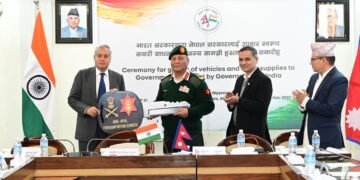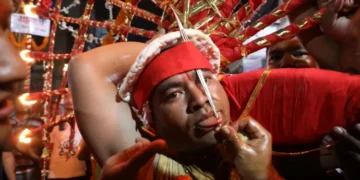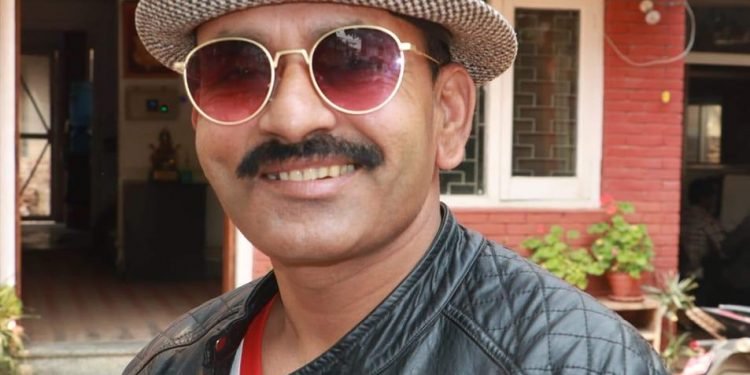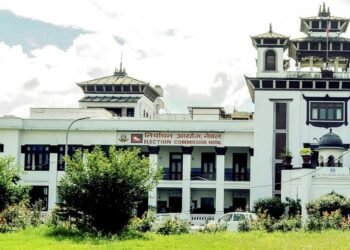Kathmandu, Feb 21: Diwakar Bhandari, 46, who is popularly known as ‘Sapati Kaka’, has been engaged in the teleserial ‘Meri Bassai’ for the past 8 years. It has been almost two decades since he started directing, scriptwriting and acting. The teleserial ‘Meri Bassai’ with 840 episodes has been broadcast since 2061 BS. He joined the show since 2072 BS and made his identity from this teleserial.
Priorly, he acted in various famous teleserials like ‘Jire Khursani’, ‘Khaskhus’, ‘La Khattam’, ‘Maaf Pam’ etc.
In ‘La Khattam’, ‘Maaf Pam’, he worked as a scriptwriter, director and actor. However, among all these teleserials, ‘Meri Bassai’ helped him establish as a ‘Sapati Kaka’ artist. Besides, the teleserial has become a good income source for him. He pays for his household expenses, personal expenses, and the expenses of educating his children with the salary he gets from this show.
Around the year 2006, a telefilm called ‘Khichadi’ was broadcast on Pokhara’s Gandaki TV. The clothes worn by that character should have been made to look like a beggar. He gave his name by himself while acting for the TV series. He used to write the script and act himself. Since then, he was called ‘Sapati Kaka’.
‘Sapati Kaka’s fascination with acting is so much that he made a film by selling off his plot in Pokhara. Directed and produced by him, the movie ‘Meri Ganga’ stars Samit KC, Sanju Dangol, Rekha Puri, Rajendra Nepali ‘Latte’ and others. He considers Rajesh Hamal and Mithila Sharma as his idols.
For the movie, in 2067 BS, he sold his land for Rs 1.6 million. He borrowed remaining Rs 600,000 to make the Rs 2.2 million movie. But the movie could not make profit. The movie was a flop.
“Now that land is worth Rs 30 million,” he says, “I was addicted to acting, Sir. I did it in hurry. I did not understand everything.”
He is SLC graduate. After graduating SLC in 2053 BS, he had no money to pursue further education. His father died in 2046 BS while his 77-year-old mother is currently in a coma. He believes that his mother’s sacrifice has helped him reach this point by taking up acting.
Acting in movies
Sapati Kaka has acted in movies such as ‘Meri Ganga’, ‘Chino’, ‘Kanyadan’, ‘Raaj’, ‘Kidnap’, ‘Nabole Ni Hasideu’, ‘Nai Nabhannu La 2’, ‘Two Hours in My Life’, ‘Room No. 13’, and ‘Chhesko’. He has played various roles in street plays, music dramas, one-act plays, and full-length plays.
First earning was Rs 100
Sapati Kaka started his acting career in 2052 BS with a telefilm ‘Dhoon’. This TV series was broadcasted on Nepal Television. From this, he received Rs 100 as salary.
Out of the money he received as salary, he spent Rs 85 to purchase clothes for his mother, and Rs 10 on purchasing a ticket for a movie ‘Nirmaya’ at Bindhyabasini theatre. And he spent remaining Rs 5 on transport fare to return home.
Sapati Kaka, who worked at Big FM in Pokhara for 12 years, worked for a long time as a reporter and programme manager. His popularity as Sapati Kaka grew far and wide in Pokhara. His two shows ‘Damadol’ and ‘Big Halla’ were very popular among the audience.
In a one-hour programme, 26 minutes of advertisements would be played. The entire FM was dominated by these two programmes. He still meets his fans who knew him since that time.
Direction is most entertaining
Sapati Kaka finds direction the most entertaining. Even though scriptwriting is boring, I still want to act. “I get pleasure in direction,” he shares, “It feels like I enjoy dying acting in front of the camera.” He was addicted to acting.
‘Do you think you are old?’
“I don’t think so,” he answered without pausing even for a second. “There is no problem to work. I don’t want to depend on others.”
He can write the content for a teleseries for one episode in one day. He can write a script for a 40-minute telefilm in one day. He writes stories on contemporary themes and social issues. He has got good response from the audience and listeners. Nepali people living abroad tend to watch teleserials more.
Sapati Kaka regrets not being able to go to college. Although he wanted to study, he could not do so because of his financial situation. His son Sangam is studying in grades three and daughter Shivani is pursuing grades five. He has a plan to let his children chase their dreams independently after they graduate plus two. I think they should choose the subject they want to study, choose the profession they want to follow.
“What advice would you give to the young generation who want to get into acting?”
You have to come to know about acting. It would be good to come with scriptwriting, directing, and acting classes. “The country has more potential. If you are extra talent in every field, there are possibilities.”
Sapati Kaka believes that people should stay back in Nepal. He does not want to go abroad when he hears that many Nepalis are suffering and facing problems there. He advises politicians and youths to do entrepreneurship.
Sapati Kaka is dejected because there is no appreciation of labor in Nepal. He emphasises that the politicians should come up with a special plan for the youth back here. He has seen a plenty of opportunities in every sector in Nepal. He believes that if the government made health and education free, migration abroad could be decreased.
Active in social service
Sapati Kaka has provided education to five orphan students with his financial support. The children have been enrolled in three different schools in Kaski. Apart from paying their school fees, he has been helping them with clothes, stationery items, and school uniforms.
After coming to know about the pain due to the lack of education, he has managed education for the children, who are earthquake victims and are from weak economic backgrounds.
“I could not eat full belly while studying at school,” he recalls his school days. “I could not get higher education due to financial problems. Understanding this pain, I am trying to help the children in need.”
What is the future plan?
Sapati Kaka wants to make movies and pursue this field lifelong. “I want to die while directing and working in front of the camera. I do not have many ambitions other than this.”




















